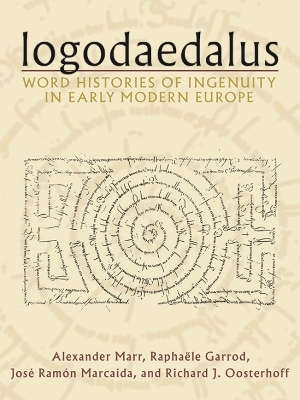
Logodaedalus
Word Histories of Ingenuity in Early Modern Europe
Seiten
2019
University of Pittsburgh Press (Verlag)
978-0-8229-4541-3 (ISBN)
University of Pittsburgh Press (Verlag)
978-0-8229-4541-3 (ISBN)
A Prehistory of Genius
Before Romantic genius, there was ingenuity. Early modern ingenuity defined every person—not just exceptional individuals—as having their own attributes and talents, stemming from an “inborn nature” that included many qualities, not just intelligence. Through ingenuity and its family of related terms, early moderns sought to understand and appreciate differences between peoples, places, and things in an attempt to classify their ingenuities and assign professions that were best suited to one’s abilities. Logodaedalus, a prehistory of genius, explores the various ways this language of ingenuity was defined, used, and manipulated between 1470 and 1750. By analyzing printed dictionaries and other lexical works across a range of languages—Latin, Italian, Spanish, French, English, German, and Dutch—the authors reveal the ways in which significant words produced meaning in history and found expression in natural philosophy, medicine, natural history, mathematics, mechanics, poetics, and artistic theory.
Before Romantic genius, there was ingenuity. Early modern ingenuity defined every person—not just exceptional individuals—as having their own attributes and talents, stemming from an “inborn nature” that included many qualities, not just intelligence. Through ingenuity and its family of related terms, early moderns sought to understand and appreciate differences between peoples, places, and things in an attempt to classify their ingenuities and assign professions that were best suited to one’s abilities. Logodaedalus, a prehistory of genius, explores the various ways this language of ingenuity was defined, used, and manipulated between 1470 and 1750. By analyzing printed dictionaries and other lexical works across a range of languages—Latin, Italian, Spanish, French, English, German, and Dutch—the authors reveal the ways in which significant words produced meaning in history and found expression in natural philosophy, medicine, natural history, mathematics, mechanics, poetics, and artistic theory.
Alexander Marr is Reader in the History of Early Modern Art at the University of Cambridge and a Fellow of Trinity Hall. Raphaële Garrod is associate professor in early modern French at the University of Oxford and a fellow of Magdalen College. She is the author of Cosmographical Novelties: Dialectic and Discovery in French Renaissance Prose. Jose Ramón Marcaida is Lecturer in Art History at the University of St Andrews, UK. Richard J. Oosterhoff is Lecturer in Early Modern history at the University of Edinburgh, UK.
| Erscheinungsdatum | 19.12.2018 |
|---|---|
| Verlagsort | Pittsburgh PA |
| Sprache | englisch |
| Themenwelt | Geisteswissenschaften ► Philosophie ► Allgemeines / Lexika |
| Geisteswissenschaften ► Philosophie ► Sprachphilosophie | |
| Geisteswissenschaften ► Sprach- / Literaturwissenschaft ► Sprachwissenschaft | |
| Naturwissenschaften | |
| ISBN-10 | 0-8229-4541-X / 082294541X |
| ISBN-13 | 978-0-8229-4541-3 / 9780822945413 |
| Zustand | Neuware |
| Haben Sie eine Frage zum Produkt? |
Mehr entdecken
aus dem Bereich
aus dem Bereich
die letzten Jahre der Philosophie und der Beginn einer neuen …
Buch | Hardcover (2024)
Klett-Cotta (Verlag)
28,00 €
Gesundheitsschutz, Selbstbestimmungsrechte, Rechtspolitik
Buch | Softcover (2024)
Kohlhammer (Verlag)
39,00 €
Jenseits von Identität | Ausgezeichnet mit dem Leipziger Buchpreis …
Buch | Softcover (2023)
Ullstein Taschenbuch Verlag
13,99 €


